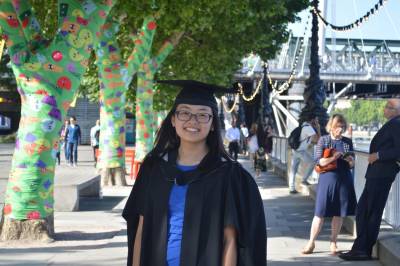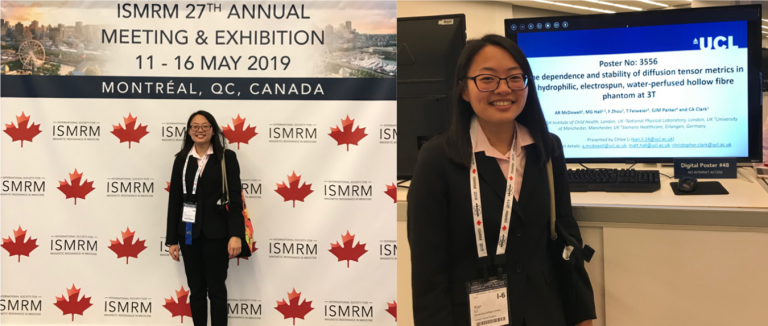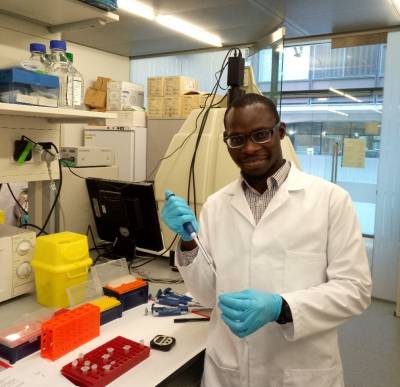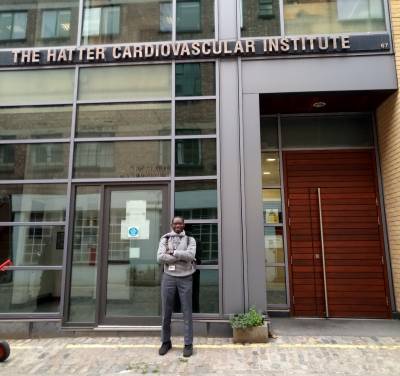- Kan Yan Chloe Li – MSc Cardiovascular Science alumnus (2017-18)

I first joined UCL in 2014 for my undergraduate Biochemistry studies. During my final year, I chose the ‘Cellular and Molecular Aspects of Cardiovascular Disease’ optional module, which I really enjoyed. The rich content and excellent delivery of the lectures by UCL Institute of Cardiovascular Science staff influenced me to apply for the MSc Cardiovascular Science programme.
During the Master’s programme I won an ICS Bursary and was elected as a Student Academic Representative. An academic highlight involved publishing my Cardiovascular Science and Disease module coursework essay on “Bioprosthetic Heart Valves: Upgrading a 50-Year Old Technology”
The Master’s turned out to be a perfect opportunity for me to further my knowledge whilst developing other transferable skills. I decided to step outside of my comfort zone, by opting for an imaging-related research project (Analysis of coronary artery patterning and microvascular distribution in congenital heart disease using synchrotron-based X-ray phase contrast imaging, supervised by Dr Andrew Cook), as opposed to a typical wet-lab project. From then on, I developed an interest in non-invasive imaging. The different experiences and skills that I have gained since joining UCL enabled me to obtain a fully-funded PhD studentship.
Outside of my academic studies, I am a keen golfer and I was awarded the Keith Wightman Scholarship (UCL) and Angela Uzielli Bursary (England Golf Trust) for academic and golfing excellence. These scholarships greatly helped me to continue my sporting interest during my studies by covering the fees for, for example, equipment, membership and tournaments. As a scholarship recipient, I wanted to find a way to give back to UCL after receiving plentiful opportunities. To do so, I became a UCL Campaign Student Ambassador and helped with the launch of UCL’s global “It’s All Academic” philanthropy and engagement campaign to raise £600 million for ground-breaking projects (such as pioneering medical research and scholarships). This involved directly engaging with UCL alumni and donors both in the UK and internationally, which was an excellent way to network.
I am currently a 1st year PhD student at UCL Great Ormond Street Institute of Child Health (UCL GOS ICH) in the Developmental Imaging and Biophysics Section. My PhD project is on “Quantifying Uncertainty in Diffusion MR Tractography Reconstructions” (fully-funded by National Physical Laboratory), supervised by Prof. Chris Clark, Dr Kiran Seunarine and Dr Matt Hall. My PhD project involves working with neurosurgeons at Great Ormond Street Hospital to help provide them with useful tractography reconstructions (with improved estimates of confidence) of surgically relevant white matter tracts during presurgical assessment of epileptic and oncology patients.

Figure: Tractographic reconstructions of corticospinal tracts (left), optic radiations (middle), and arcuate fasciculus (right) of a healthy brain.
In my doctoral studies so far, I have gained knowledge in a wide range of areas, including MR physics, neuroanatomy, programming, tractography, measurement science and statistics. I also attended my first international conference in Montreal and had the opportunity to present a digital poster. I still play golf during my spare time and participate in fundraising activities (for example, volunteering at the 2019 Formula 1 British Grand Prix by representing GOSH Charity and organising fun charity golf days).
The MSc Cardiovascular Science programme definitely helped me achieve my goal of becoming a more all-rounded, competent researcher. This programme can also provide you with many opportunities inside and outside of the academic setting.

27th International Society for Magnetic Resonance in Medicine conference where I presented a digital poster.
- Ayo Oguntade, UK FCO/Chevening Scholar
My MSc Journey at the Institute of Cardiovascular Science, UCL

The news of being awarded the UK FCO/Chevening scholarship to pursue graduate studies at UCL came on the 8th of June 2017 while I was attending an international seminar on cardiovascular epidemiology in Kuala Lumpur. I felt so delighted to have been selected out of more than 65,000 applicants globally to pursue my dream of advanced studies in Cardiovascular Science at London’s global university.
The Institute of Cardiovascular Science, University College London (UCL ICS), a world leading centre in advanced cardiovascular research, renowned for pioneering work on myocardial ischaemia-reperfusion injury and development of the gene score for diagnosis of familial hypercholesterolaemia (a cause of early onset heart attacks). I waited anxiously to resume studies and attend teachings delivered by the eminent scholars at UCL. I commenced studies last September and it has been a fast-paced year with exposure to breath-taking research at the institute from cardiac electrophysiology and ion channels to genome sequencing and angiogenesis in zebrafish. What makes the institute stand out is the support and pastoral care provided by the tutors and the ability to learn transferable skills in the field of cardiac research. If you want to learn cardiovascular genomics and metabolomics or even cardiovascular epidemiology, UCL is the place to be. If you want to see diversity, the MSc class is a diverse class, consisting of clinicians, intercalating medical students and bioscientists and you will enjoy the year exploring London’s social life together. If you are interested in the history of cardiovascular research, the curated paintings of Sir Charles Bell at the UCL Art Museum is an inspiration along with the works of Ernest Starling, Bernard Katz, Sir James Black and numerous Nobel prize winners the University has produced.
The program stimulates one’s critical thinking and problem-solving skills. I have learnt group work, peer review, coding and data analysis using Stata. I have also been engaged in grant review exercises and even research poster presentations. These are all important transferable skills for a cardiovascular scientist. The MSc program at ICS is unique in having an optional clinical cardiology module with clinical rotations at the UK’s and Europe’s largest heart centre, “the Barts Heart Centre” where clinicians can see how clinical research is translated to improve patient’s care and observe the use of state-of-the art cardiac treatment facilities. Such clinical observation is particularly attractive for clinicians from developing countries like myself who rarely have such experiences except in textbooks.
Are you passionate about cardiovascular research? Do you want to become one of the leading figures in translational research of heart diseases? Do you want to become an academic-clinician? Why not apply to the ICS UCL!

 Close
Close
Study at ICS

